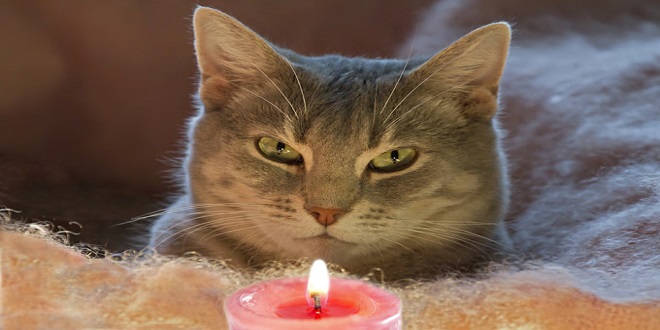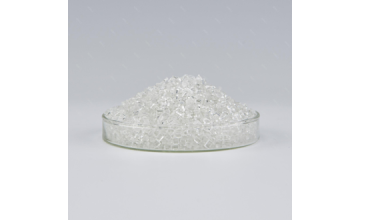Are Candles Safe For Cats?

Scented candles can be more than just ordinary candles. The best way to create a calm atmosphere in your home and make it smell wonderful is to light scented candles. After a long day, it has a relaxing and soothing scent. It is a soothing and relaxing scent that helps us to relax when we’re at home cuddling our cute cat. We forgot to mention cat! Did you ever think that scented candles could cause harm to your cat? Let’s find out.
Research shows that the type of candle and its placement can have an impact on the amount of harm done. It is not healthy to use low-quality, mass-produced scented candles made from paraffin wax. Paraffin wax is the main ingredient in most scented candles. Paraffin wax is made of petroleum, a byproduct of the production gasoline. Paraffin is the last residue from the refining of crude oil. Paraffin is made from the bottom of an oil barrel. It is bleached with dioxin and other toxic chemicals, and then texturized using a chemical called Acrolyn. The hardener is then added to the mixture with stearic acid (a byproduct from meatpacking slaughterhouses). To give paraffin candles a rustic or textured look, many candle makers add animal fats.
The American Lung Association advises against the burning of paraffin candles. These candles can release toxins and other dangerous chemicals into the air. Because cats are smaller than humans, paraffin wax candles can accumulate chemicals in their bodies. They can’t process these chemicals as fast as humans.
You can also use organic wax candles if you want to spend some time with your cat and enjoy a relaxing moment. You and your cat will be happier with organic wax candles like vegetable wax, coconut wax, or soy wax. They are completely biodegradable and come from renewable resources. They also use natural fragrances, which means that the candles burn for longer than paraffin candles. They are also more sustainable and healthier for you. These candles are more expensive than paraffin candles, but they are well worth the money. However, it is important to read the labels before you purchase. You can also select scents that are safe to use for cats, such as lavender, frankincense and catnip.
When choosing a scent candle, be sure to check the ingredients.
- Paraffin: The majority of candles are made from paraffin, which is a wax that has been extracted from petroleum waste and releases carcinogens when it’s burned.
- Lead: Some wicks may have a metal core that could contain lead.It is possible that lead in the air could exceed the EPA threshold. Even low levels can cause damage to the central nervous system.
- Benzene is a known carcinogen that can be emitted from soot in some candles.
- Acrolein and formaldehyde are dangerous chemicals that can reduce the quality of your home’s air.
- Toluene is a compound found in candle soot that can affect the central nervous systems.
- Artificial colors and fragrances can lead to allergies and other respiratory problems.
We now know what candles to avoid. Let’s talk about where and how to place candles.
The candle can be placed on a stable surface that is heat resistant to protect it from any damage. Be sure to keep the candle clear of any other flammable objects. Bedding, curtains, paper, and any other objects that could catch fire should be removed. You should only burn a candle in a well-ventilated area. You shouldn’t have too many candles in one room, or in a home with limited airflow. If possible, keep your fans on and open the windows to stop candle smokes from building up in the room.
Keep cats away from burning candles! To avoid accidental fires, keep burning candles away from your cat’s reach. Cats love to jump on surfaces and knock objects off of them. To avoid this, make sure that you don’t leave a lit candle unattended. This can cause a fire to start, which could result in your cat being burned or your entire room.
Avoid scented candle wax for cats. If your cat decides that it wants to lick the wax, it can lead to burns and fires. Ingestion can lead to diarrhea and upset stomachs. It can also cause skin irritation in cats by direct contact.
Too strong scents can cause irritation in your feline companions. Because cats metabolize fragrance differently, they are more sensitive than humans to certain scents. They don’t like strong scents. Certain fragrances may make your cat feel sick or uncomfortable. Every cat is different, but some cats can be sensitive to certain scents. Some cats might vomit or dry heave if the scent is too strong. Citrus scent is one of the most objectionable scents for cats. Citrus oils like grapefruit, lime, lemon, and lime are toxic to cats. This is important to remember when choosing which scented candles you want to light.
Make sure to check your cat’s health. It is not recommended to use scented candles if your cat has asthma. Even if your cat does not have any respiratory issues they could develop respiratory problems. Always have your cat examined by a vet to make sure they are safe. If you notice any signs or symptoms, contact your vet immediately. These are the symptoms:
* Coughing
* Watery eyes
* Sneezing
* Itching
* Skin redness/rashes
* Runny nose
* Respiratory distress (difficulty breathing, fast breathing and coughing).
* Vomiting
Also, are scented candles harmful for cats? Yes! You can enjoy your relaxing scented candles without worrying about the risks to your cat and your pets. These are the things to remember if you want to burn your scented candles.
- Paraffin wax candles should be avoided
- Organic wax candles are a good choice
- Be aware of fire hazards
- Never leave the candle unattended
- Protect your candles with a cover or shield
- Keep cats away
- Avoid strong scents
- In a well-ventilated area, you can burn.
- You shouldn’t have too many candles in one place.
- Make sure to check the respiratory health of your pet.
Conclusion
Although scented candles can provide a calming and relaxing experience for humans, it is not something that anyone wants to give up on their feline friend. Both can be kept! To avoid any unfortunate events in your house or with your pet, make sure safety is your first priority
Weather conditions, such as rainfall, temperature, and sunlight, directly impact agricultural activities. Farmers rely on favorable weather patterns for crop growth, while extreme weather events like droughts or floods can have devastating effects on crops.





